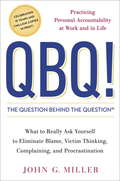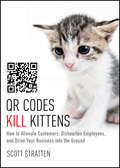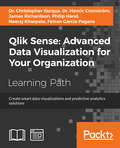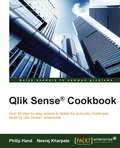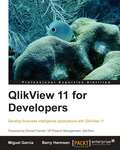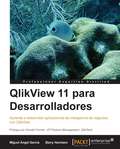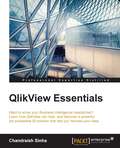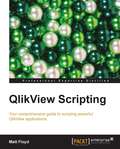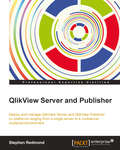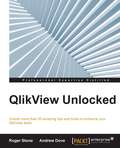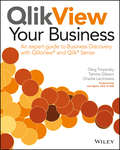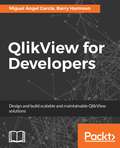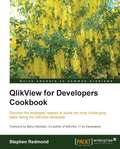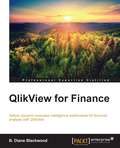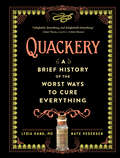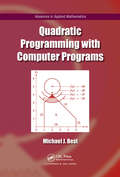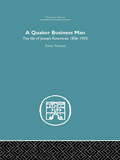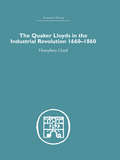- Table View
- List View
QBQ! The Question Behind the Question®
by John G. MillerNow, more than ever, the absence of personal accountability in our culture is a problem that has led to a proliferation of shunning responsibility, blaming others, and playing the victim. In times of political and social upheaval around the world, it appears that few are immune, as they look to explain-and complain-about the state of our affairs. This remarkable and timeless book gives a practical and inspiring message for putting personal accountability into daily action, with astonishing results.
QI-TECH: A Chinese Technology Company for Sale
by Walter Kuemmerle Chad EllisQI-TECH, is a Chinese manufacturer of precision coordinate measurement machines. A foreign investor who holds 50% of QI-TECH must negotiate a sale with its Chinese partner and a potential buyer (a large Western measurement machine company). For this purpose the foreign investor must value the joint venture and develop a viable deal structure and negotiation strategy.
QR Codes Kill Kittens
by Scott Stratten Alison KramerEasy to digest tips and tools on how not to run a businessExperts are constantly telling us what we need to be doing to improve our businesses. Hundreds of books in the market are filled with advice from these experts. But how can you filter out all of the bad advice, misinformation, and misuse of business tools that is out there? None of us needs another list of what we should be doing. QR Codes Kill Kittens tells you what not to do. Easy to digest, easy to avoid. The book is separated into several sections, and each will include a story related to the topic in addition to tips and explanations on what not to do.Includes real-life examples along with tips and guidance on experts, human resources, marketing/branding, networking (in person and online), public relations, and customer serviceWritten by Scott Stratten, author of UnMarketing and the President of UnMarketing.com, a company that combines efforts in viral, social, and authentic marketing; he has appeared on Mashable.com and CNN.com, and in the Wall Street Journal, USA Today, and Fast CompanyIt doesn't do you any good to do a few things right and a lot of things wrong. Find out what not to do. If reading this book saves just one kitten's life, it's worth it.
Qalaa Holdings and the Egyptian Refining Company
by Victoria Ivashina Marc HomsyThis case follows Qalaa Holdings, a successful Egypt-based private equity firm, and gives insight into the types of investments it pursued, its growth over time, and the limited partner base it had at hand. It also allows students to consider and debate whether the traditional private equity fund structure can be applied in Africa. In particular, the case focuses on one of Qalaa's largest and most difficult greenfield infrastructure projects: Egyptian Refining Company. It tracks the project from its structuring stage in 2007, through the adverse periods of the global financial crisis and Arab Spring, until 2012. At this time, Hisham El-Khazindar, co-founder and managing director, had to decide on the fate of the project. While passionate about contributing to Africa's development, he could not ignore the challenges: the sheer size and complexity of the project, the high financial stakes, and the region's on-going unstable political environment.
Qatar: Energy for Development
by Aldo Musacchio Colin Donovan Samir Mikati Rami Sarafa Abdulla AlmisnadDespite being the richest country in the world on a per capita basis, for analysts Qatar belongs in the group of emerging markets considered "frontier markets." This case analyzes the strengths and weaknesses of the development strategy of this small country as set forth by Emir Hamad bin Khalifa Al Thani, who ruled from 1995 to 2013. In 2013, for the first time in Qatar's history, Emir Hamad passed on control of the government to his son Tamim peacefully and Tamim, as Emir, promised to continue with the development strategy of economic diversification set forth by his father. Yet, it is not clear if the ambitious investments in infrastructure, education, tourism and real estate Emir Hamad made were enough to steer the economy away from its dependence on gas exports.
Qatar: Selected Issues (Imf Staff Country Reports #Country Report No. 14/109)
by International Monetary Fund. Middle East and Central Asia Dept.A report from the International Monetary Fund.
Qihoo
by Feng ZhuQihoo, one of the largest Internet companies in China today, was founded in 2005. The company started its business by offering a security software product, and quickly dominated the market in China after its unusual move of giving its product away for free in 2009. Later, it expanded its offering to cover a broad spectrum of Internet and mobile security products. In 2012 the company launched its own Internet search engine called So.com. By August 2013, So.com captured 18% PC market share, and had posed a threat to Baidu, China's largest and most established search engine provider. Yet to compete against Baidu and other Chinese Internet giants in the long run, Qihoo needed to find a way to replicate its PC market success in the mobile market. How could Qihoo continue to evolve its search engine business and what was the best mobile strategy to help the company grow?
Qlik Sense Cookbook: Over 80 recipes on data analytics to solve business intelligence challenges, 2nd Edition
by Philip Hand Neeraj Kharpate Pablo LabbeCreate dynamic dashboards to perform interactive analytics for business intelligence operationsKey FeaturesExplore newly added features in Qlik SenseDiscover best practices to work with data using Qlik SenseLearn to implement advanced functions for better data insightBook DescriptionQlik Sense allows you to explore simple and complex data to reveal hidden insight and data relationships that help you make quality decisions for overall productivity. An expert Qlik Sense user can use its features for business intelligence in an enterprise environment effectively. Qlik Sense Cookbook is an excellent guide for all aspiring Qlik Sense developers and will empower you to create featured desktop applications to obtain daily insights at work.This book takes you through the basics and advanced functions of Qlik Sense February 2018 release. You’ll start with a quick refresher on obtaining data from data files and databases, and move on to some more refined features including visualization, and scripting, as well as managing apps and user interfaces. You will then understand how to work with advanced functions like set analysis and set expressions. As you make your way through this book, you will uncover newly added features in Qlik Sense such as new visualizations, label expressions and colors for dimension and measures.By the end of this book, you will have explored various visualization extensions to create your own interactive dashboard with the required tips and tricks. This will help you overcome challenging situations while developing your applications in Qlik Sense.What you will learnSource, preview, and distribute your data through interactive dashboardsExplore and work with the latest visualization functionsLearn how to write and use script subroutinesMake your UI advanced and intuitive with custom objects and indicatorsUse visualization extensions for your Qlik Sense dashboardWork with Aggr and learn to use it within set analysisWho this book is forQlik Sense Cookbook is for data and BI analysts who want to become well versed with Qlik Sense to apply business intelligence in data. If you are a beginner in data analytics and want to adopt an independent recipe-based approach to learn the required concepts and services in detail, this book is ideal! Individuals with prior knowledge of its sister product, QlikView, will also benefit from this book. Familiarity with the basics of business intelligence is a prerequisite.
Qlik Sense: Create smart data visualizations and predictive analytics solutions
by James Richardson Ferran Garcia Pagans Philip Hand Neeraj Kharpate Henric CronströmKey Features Get a practical demonstration of discovering data for sales, human resources, and more using Qlik Sense Create dynamic dashboards for business intelligence and predictive analytics Create and collaborate comprehensive analytical solutions using Rattle and Qlik Sense Book Description Qlik Sense is powerful and creative visual analytics software that allows users to discover data, explore it, and dig out meaningful insights in order to make a profit and make decisions for your business. This course begins by introducing you to the features and functions of the most modern edition of Qlik Sense so you get to grips with the application. The course will teach you how to administer the data architecture in Qlik Sense, enabling you to customize your own Qlik Sense application for your business intelligence needs. It also contains numerous recipes to help you overcome challenging situations while creating fully featured desktop applications in Qlik Sense. It explains how to combine Rattle and Qlik Sense Desktop to apply predictive analytics to your data to develop real-world interactive data applications. The course includes premium content from three of our most popular books: [*] Learning Qlik Sense: The Official Guide Second Edition [*] Qlik Sense Cookbook [*] Predictive Analytics using Rattle and Qlik Sense On completion of this course, you will be self-sufficient in improving your data analysis and will know how to apply predictive analytics to your datasets. Through this course, you will be able to create predictive models and data applications, allowing you to explore your data insights much deeper. What you will learn Build simple visualization models with Rattle and Qlik Sense Desktop Get to grips with the life cycle and new visualization functions of a Qlik Sense application Discover simple ways to examine data and get it ready for analysis Visualize your data with Qlik Sense's engaging and informative graphs Build efficient and responsive Associative Models Optimize Qlik Sense for sales, human resources, and demographic data discovery Explore various tips and tricks of navigation for the Qlik Sense® front end Develop creative extensions for your Qlik Sense® dashboard
Qlik Sense® Cookbook
by Philip Hand Neeraj KharpateOver 80 step-by-step recipes to tackle the everyday challenges faced by Qlik Sense® developers About This Book * Create dynamic dashboards for business intelligence * Discover the techniques and practices for Qlik Sense® * Delve into a broad range of topics covering the Qlik Sense® backend and the all-important user interface Who This Book Is For The book is for everybody who have been exposed to Qlik Sense® and want to start using it actively for business intelligence. Anybody with prior knowledge of its sister product, QlikView, will also benefit from this book. Familiarity with the basics of business intelligence is a prerequisite. What You Will Learn * Source, load, preview, and distribute your organization's information * Maximize the effect of visualizations for different types of data * Get to grips with the new visualization functions and add bespoke features not covered in the standard options * Leverage scripting tools, techniques, and best practices that once implemented, never stop adding value * Make your user interface more advanced and intuitive with various custom objects and indicators * Explore various tips and tricks of navigation for the Qlik Sense® frontend * Develop creative extensions for your Qlik Sense® dashboard In Detail This book is an excellent guide for all aspiring Qlik Sense® developers. It will take you through the basics, right through to the use of more advanced functions. With the recipes in this book, you will be empowered to create fully featured desktop applications in Qlik Sense®. Starting with a quick refresher on obtaining data from data files and databases, this book moves on to the more refined features of Qlik Sense®, including visualization, scripting, and set analysis. The tips and tricks provided will help you to overcome challenging situations while developing your applications in Qlik Sense®. This and more will help you to deliver engaging dashboards and reports efficiently. By the end of the book, you will be an expert user of Qlik Sense® and will be able to use its features effectively for business intelligence in an enterprise environment. Style and approach This book is the perfect mix of essential theory combined with real-life examples, with clear explanations of sophisticated Qlik Sense® concepts. Each recipe begins with a task-based problem and the answers are provided in simple steps. This book follows an intuitive problem and solution approach that is easy to follow.
QlikView 11 for Developers
by Barry Harmsen Miguel GarciaIt will be a step-by-step tutorial that will discuss best practices. The book is structured in such a way that it can be read both from start to end or can be dipped into. If you are a developer who is looking to learn a fast and easy way to learn to develop your business intelligence apps with QlikView, then this book is for you. If you are a power-user in a QlikView environment, then you will find quicker ways of working with QlikView. You should know the basics of business intelligence before you pick up this book. This book covers QlikView Desktop Personal Edition. Deployments to QlikView Server/Publisher are out of scope for this book.
QlikView 11 para Desarrolladores
by Miguel Angel Garcia Barry HarmsenEste libro va dirigido a desarrolladores y usuarios que quieren aprender a crear aplicaciones de Inteligencia de Negocios con QlikView. Desarrolladores que ya hayan usado QlikView por un tiempo podrán encontrar recomendaciones útiles y mejores prácticas para hacer uso más efectivo de QlikView. Este libro solamente cubre QlikView Desktop. Implementaciones en QlikView Server y Publisher estñan fuera del alcance de este libro. Este libro no va enfocado a administradores de servidores QlikView.
QlikView Essentials
by Chandraish SinhaWant to solve your Business Intelligence headaches? Learn how QlikView can help, and discover a powerful yet accessible BI solution that lets you harness your data About This Book * Design interactive dashboards using QlikView to share sharp BI insights * Discover how to create effective data models to manage and harness your data with QlikView's ETL functionality * Learn and implement best practices to successfully integrate QlikView within your organization Who This Book Is For If you recognize the challenges of harnessing data for a modern business this book is for. Maybe you already know a little about QlikView - if you want to learn more, QlikView Essentials is a great way to develop your knowledge and skills. What You Will Learn * Learn the complete QlikView workflow - from loading data, to visualization and analytics * Learn how to Load data from different sources, including QVD files and how to optimize data models for accuracy and precision * Discover solutions to common data modeling problems, so you can respond quickly to changing situations * Create accessible dashboards and quality data visualizations to share insights effectively * Learn how to deploy your BI application for optimal availability In Detail This guide demonstrates just how easy it is to get started with QlikView and create your own BI application. Featuring an introduction to its core features before exploring how to load data and model it, you'll soon become more confident that you can take full advantage of QlikView's capabilities. You will also learn how to use QVD files with QlikView - and how they offer a simpler way of handling data. After digging deeper into data handling, as you learn how to use mapping tables and create a master calendar, you'll then find out how to get the most from QlikView's visualization features - vital if you are to use your data insights effectively. From accessible and user friendly dashboards to strategies and best practices for subjecting data to further analysis, you can be confident that you'll be prepared to get the most out of your data with QlikView. With details on how to finally secure your application and deploy it for a successful integration in your organization, QlikView Essentials underlines exactly why QlikView is becoming more and more popular for businesses that understand the value of data. Style and approach The book takes a step-by-step approach to QlikView development, and is explained in an easy-to-follow style. Each topic is accompanied by an exercise so you can put your knowledge into practice. This book will be useful for you no matter what your needs and experience levels with the technology.
QlikView Scripting
by Matt FloydThis mini book offers information about QlikView scripting written in an easy-to-understand manner, and covers QlikView scripting from basic to advanced features in a compact format.If you are a basic orintermediate developer with some knowledge of QlikView applications and a basic understanding of QlikView scripting and data extraction and manipulation, this book will be great for you. If you are an advanced user, you can also use this book as a reference guide and teaching aid. If you are a QlikView project team member such as a business user, data/ETL professional, project manager, orsystems analyst, you can also benefit from gaining an understanding of the structure and the challenges of writing an efficient and useful QlikView application.
QlikView Server and Publisher
by Stephen RedmondThis is a comprehensive guide with a step-by-step approach that enables you to host and manage servers using QlikView Server and QlikView Publisher. If you are a server administrator wanting to learn about how to deploy QlikView Server for server management,analysis and testing, and QlikView Publisher for publishing of business content then this is the perfect book for you. No prior experience with QlikView is expected.
QlikView Unlocked
by Roger Stone Andrew DoveUnlock more than 50 amazing tips and tricks to enhance your QlikView skillsAbout This BookLearn QlikView development best practices from the expertsDiscover valuable tips, tricks, and undocumented featuresA fast-paced guide with techniques and best practices to optimize high-performance, robust, and scalable applicationsWho This Book Is ForQlikView Unlocked is intended for anyone with at least some experience in designing, developing, or supporting QlikView applications. Whether you are new to QlikView or are a seasoned developer, there is something for everyone in this book.What You Will LearnBuild the QlikView environment correctly so that it is flexible and robustDeliver a successful QlikView projectUnderstand and implement QlikView best practicesDiscover the best way to prototype, develop, and deploy applicationsOvercome data modeling challengesExplore the in's and out's of Section AccessSolve post-deployment issues in Server and PublisherIn DetailQlikView is considered as one of the most used tool for Business Intelligence (BI). An efficient BI tool should provide five important capabilities for effective data analysis--collection (gathering important information), reporting, analysis (the ability to interact with data), visualization (the presentation of data), and discovery (exploring data). QlikView offers all these necessary skills required to deal with big data in real-world scenarios.QlikView Unlocked will provide you with new insights to get the very best from QlikView. This book will help you to develop skills to work with data efficiently. We will cover all the secrets of unleashing the full power of QlikView, which will enable you to make better use of the tool and create better results for future projects.In the course of this book, we will walk you through techniques and best practices that will enable you to be more productive. You will gain quick insights into the tool with the help of short steps called "keys," which will help you discover new features of QlikView. Moving on you will learn new techniques for data visualization, scripting, data modeling, and more. This book will then cover best practices to help you establish an efficient system with improved performance. We will also teach you some tricks that will help you speed up development processes, monitor data with dashboards, and so on.By the end of this book, you will have gained beneficial tips, tricks, and techniques to enhance the overall experience of working with QlikView.Style and approachWritten in a fairly informal style, this is a book that can be read cover-to-cover or simply used as a "how-to" reference. Using real-world examples with clear explanations, code samples, and screenshots, you will be able understand each topic fully. You will be able to apply the knowledge gained to your QlikView projects.
QlikView Your Business: An Expert Guide To Business Discovery With Qlikview And Qlik Sense
by Oleg Troyansky Charlie Leichtweis Tammy Gibson Lars Bjorkcomplex data points. Many visualization tools are complex and require advanced training, but QlikView's toolset was specifically designed for speed and ease of use. This book gets you up and running quickly, using QlikView and Qlik Sense to deliver timely and relevant results.Develop solutions to analyze sales, profitability, and inventoryUnderstand the business scenarios relevant to each solutionUnderstand best practices for data modelingLearn advanced techniques in data aggregation and chart developmentThis book goes beyond the basics to illustrate little-known features and techniques for getting the most out of the toolset, supporting the needs of the business analysts who use it, as well as the developers who support it. QlikView Your Business is your essential guide to better data analysis.
QlikView for Developers
by Miguel Angel Garcia Barry HarmsenDrive value and insight by developing business critical applications with QlikView 12 About This Book • Develop your own scalable and maintainable QlikView applications • Learn time-saving techniques for making your QlikView development more efficient • A one-stop guide to developing BI applications with QlikView Who This Book Is For This book is for anyone interested in working with QlikView or who has attended QlikView Developer training. The book caters for all QlikView developers, beginners and experts alike, and anyone who wants to improve their QlikView skills. What You Will Learn • Understand important changes made in QlikView 12 • Learn the techniques and best practices to transform data in QlikView via scripts • Load data from disparate sources to build an associative Data Model • Build robust data models and overcome common modeling challenges • Designing data visualization objects to present performance measures with charts and tables • Learn to use dimensions and expressions in QlikView objects • Utilize QlikView's built-in aggregation functions to achieve complex calculations • Create Point In Time reporting and achieving complex calculations using Set Analysis • Create a consistent and interactive user interface • Ensure your QlikView applications and data are protected • Optimize the QlikView Data Model • Constructing a data architecture that supports scalable QlikView deployments • Learn time-saving techniques for making your QlikView development more efficient In Detail QlikView is one of the most flexible and powerful Business Intelligence platforms around. If you want to build data into your organization, build it around QlikView. Don't get caught in the gap between data and knowledge – find out how QlikView can help you unlock insights and data potential with ease. Whether you're new to QlikView or want to get up to speed with the features and functionality of QlikView, this book starts at a basic level and delves more deeply to demonstrate how to make QlikView work for you, and make it meet the needs of your organization. Using a real-world use-case to highlight the extensive impact of effective business analytics, this book might well be your silver bullet for success. A superb hands-on guide to get you started by exploring the fundamentals of QlikView before learning how to successfully implement it, technically and strategically. You'll learn valuable tips, tricks, and insightful information on loading different types of data into QlikView, and how to model it effectively. You will also learn how to write useful scripts for QlikView to handle potentially complex data transformations in a way that is simple and elegant. From ensuring consistency and clarity in your data models, to techniques for managing expressions using variables, this book makes sure that your QlikView projects are organized in a way that's most productive for you and key stakeholders. Style and approach This book will help you learn QlikView Development from a basic to a practitioner level using a step-by-step approach. It is smartly built around a practical case study – HighCloud Airlines – to help you gain an in-depth understanding of how to build applications for Business Intelligence using QlikView.
QlikView for Developers Cookbook
by Stephen RedmondThe recipes in this Cookbook provide a concise yet practical guide on how to become an excellent QlikView developer. The book begins with intermediate level recipes and then moves on to more complex recipes in an incremental manner.This book is for anyone who has either attended QlikView Developer training or has taught themselves QlikView from books or online sources. You might be working for a QlikView customer, partner, or even QlikView themselves (or want to!) and want to improve your QlikView skills.
QlikView for Finance
by B. Diane BlackwoodConcoct dynamic business intelligence dashboards for financial analysis with QlikView About This Book * Get accustomed to QlikView features for effective data analysis and visualization in Finance * Employ the Memory data store, which refreshes data in real time, providing a faster response to business financial information * A step-by step guide to using Qlikview features such as key performance indicators, interactive charts, and tables for financial analysis Who This Book Is For If you are a finance professional with basic knowledge of QlikView functions and wish to increase your knowledge of QlikView to apply it in the field of finance, then this book is for you. A good knowledge of financial aspects is an must-have. What You Will Learn * Design Key Performance Indicators and extend your revenue ratio reporting * Set up actions within a Text Object and create variables to make a chart toggle between visible and not visible * Merge data from multiple sources to get more asset management options * Examine good and bad practices in dashboard design and create a Group button to make more data available in less space * Analyse the sales dashboard by adding tending lines and forecasting * Create input boxes and use the input in formulas to perform "What If" analysis * Examine the Key Performance Indicator (KPI) and Inventory Turnover, and investigate the usefulness of Pivot * Create a QlikView analysis document and add data to it to gain deep insights In Detail This book is an effective step-by-step tutoring guide for financial analysis using Qlikview. It begins by teaching you the crucial concepts of Qlikview Finance to help you develop an effective understanding of financial data analysis and finance. The book then goes on to cover real-world, practical examples on the use of Qlikview for financial planning and analysis, expense management, risk management, and more. Moving on, topics such as Asset Management QlikView Dashboard and Retail Sales Analysis are covered in a strategic way. We then shift the focus to deal with the concepts of Inventory, Supply Chain, and Plant Coverage Dashboards. The book then reaches its conclusion by dealing with ways to share your QlikView insights. By the end of this book, you will have a good understanding of how to use Qlikview for numerous applications in finance. Style and approach This book is designed to explore what can be done in QlikView to facilitate Financial Analysis. It follows a step-by-step approach and each chapter has easy-to-follow, hands-on examples of important concepts.
QoS Management of Web Services
by Michael R. Lyu Zibin ZhengQuality-of-Service (QoS) is normally used to describe the non-functional characteristics of Web services and as a criterion for evaluating different Web services. QoS Management of Web Services presents a new distributed QoS evaluation framework for these services. Moreover, three QoS prediction methods and two methods for creating fault-tolerant Web services are also proposed in this book. It not only provides the latest research results, but also presents an excellent overview of QoS management of Web sciences, making it a valuable resource for researchers and graduate students in service computing. Zibin Zheng is an associate research fellow at the Shenzhen Research Institute, The Chinese University of Hong Kong, China. Professor Michael R. Lyu also works at the same institute.
Quackery: A Brief History of the Worst Ways to Cure Everything
by Lydia Kang Nate PedersenWhat won’t we try in our quest for perfect health, beauty, and the fountain of youth? Well, just imagine a time when doctors prescribed morphine for crying infants. When liquefied gold was touted as immortality in a glass. And when strychnine—yes, that strychnine, the one used in rat poison—was dosed like Viagra. Looking back with fascination, horror, and not a little dash of dark, knowing humor, Quackery recounts the lively, at times unbelievable, history of medical misfires and malpractices. Ranging from the merely weird to the outright dangerous, here are dozens of outlandish, morbidly hilarious “treatments”—conceived by doctors and scientists, by spiritualists and snake oil salesmen (yes, they literally tried to sell snake oil)—that were predicated on a range of cluelessness, trial and error, and straight-up scams. With vintage illustrations, photographs, and advertisements throughout, Quackery seamlessly combines macabre humor with science and storytelling to reveal an important and disturbing side of the ever-evolving field of medicine.
Quadratic Programming with Computer Programs (Advances in Applied Mathematics)
by Michael J. BestQuadratic programming is a mathematical technique that allows for the optimization of a quadratic function in several variables. QP is a subset of Operations Research and is the next higher lever of sophistication than Linear Programming. It is a key mathematical tool in Portfolio Optimization and structural plasticity. This is useful in Civil Engineering as well as Statistics.
Quaker Business Man: The Life of Joseph Rowntree
by Anne VernonFirst Published in 2005. Routledge is an imprint of Taylor & Francis, an informa company.
Quaker Lloyds in the Industrial Revolution
by Humphrey LloydFirst Published in 2005. This book is about the Quaker Lloyds in the time of the industrial Revolution from 1660 to 1860. Inspired at first by several finds of unpublished letters, it was foreseen as the biography of a family, but progressive researches while work on the material was being carried out have made it a family and business history combined.
